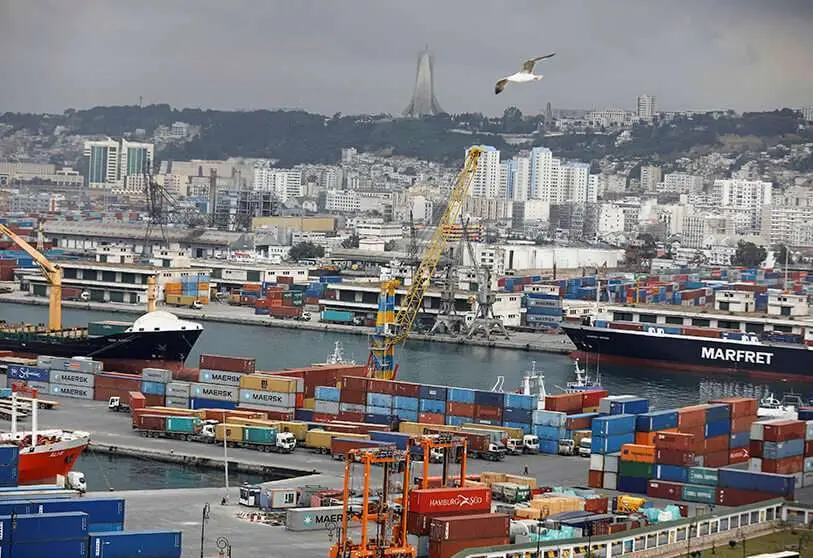Argelia interrumpe el comercio con España

After two decades, Algeria broke the Treaty of Friendship, Good Neighbourliness and Cooperation with Spain as a measure of protest in relation to the rejection of the Spanish political movement that meant the recognition of Morocco's autonomy proposal for Western Sahara as the most "serious, credible and realistic" way to resolve the Sahrawi conflict that has lasted more than 40 years.
But the Algerian response has not stopped there, and this day has seen the announcement of the suspension of trade relations with Spain. Algerian banks and financial institutions are freezing Spanish bank accounts, a measure that comes into effect today, Thursday 9 June. Thus, the Algerian Professional Association of Banks issued an order to "stop exports and imports to and from Spain", addressed to all financial institutions and bank managers in Algeria, in what, according to experts, resembles a "rupture of economic relations", as reported by Al Ain News.
The procedure is part of the Algerian authorities' decision to suspend the Treaty of Friendship, Good Neighbourliness and Cooperation with Spain, which was signed by former Algerian President Abdelaziz Bouteflika and Spain's King Juan Carlos I in October 2002.

Thus, Algeria's diplomatic escalation against Spain has now been joined by an economic escalation, which is of great importance. It should be recalled that the volume of trade between Algeria and Spain has reached an annual rate of more than 8 billion dollars.
Now, the gas contracts and a possible supply cut are of concern. A third of the gas that Spain consumes comes from Algeria and supplies cannot be cut off until the next decade, only renegotiation of the existing agreement, which is the one signed between Naturgy and the Algerian state gas company. In other words, supply is guaranteed for another year, although the price could be increased by Algeria.
Last month, the state-owned Sonatrach threatened Spain over its intention to resell Algerian gas to Morocco after the regasification process on Spanish territory, and threatened to touch gas supply contracts with Spain.

Algerian-Spanish relations are in an unprecedented state of tension, as Algeria recalled its ambassador to Madrid last March over diplomatic differences, mainly related to the decision of the Spanish government of Pedro Sánchez to recognise Morocco's autonomy proposal for Western Sahara as the 'most serious, credible and realistic', a decision that Algeria described as 'unjustifiable'.
Pedro Sánchez sent a letter to King Mohammed VI showing his support for the Moroccan initiative on the Sahara, and the Alawite monarch responded by inviting the Spanish president to Rabat in the middle of Ramadan. Following the contacts between the two leaders, a road map was drawn up detailing the next steps to be taken to re-establish relations between the two neighbouring countries, some of them important, such as the reactivation of Operation Crossing the Strait and the reopening of land borders.
This step taken by Spain marked the end of an open diplomatic conflict between Spain and Morocco that was triggered by the reception of Brahim Ghali, leader of the Polisario Front, in Spanish territory in April last year to be treated for a respiratory ailment in a hospital in Logroño. The Kingdom considered that the Spanish country did not cooperate and failed to inform it properly despite considering Spain a neighbouring country and ally. This was followed by other complicated episodes such as the entry of thousands of irregular immigrants through the Ceuta border and the withdrawal of the Moroccan ambassador from Madrid. Underlying all this was Morocco's unease at not receiving Spanish support over Western Sahara.

Spain launched gestures of rapprochement, such as those made by King Felipe VI and the appointment of José Manuel Albares as Foreign Minister to replace Arancha González Laya, who had been badly affected by the Ghali affair.
Finally, with the decision of Pedro Sánchez's government to support Morocco's plan for the autonomy of Western Sahara, the waters returned to normal and deep diplomatic relations between the two countries were re-established.
The Alawi kingdom has received the support of many international powers for its initiative for broad autonomy for the Sahrawi territory under Moroccan sovereignty. These include the United States, Germany, the United Kingdom and Spain itself. This is in contrast to the Polisario Front's proposal for a referendum on independence for the Sahrawi people, which has less international support, including that of Algeria, Morocco's great rival in North Africa.
José Manuel Albares, Spanish Foreign Minister, referred to Algeria's announcement to freeze trade relations. "We are analysing the implications and will give a calm, constructive and firm response in defence of Spanish interests", said José Manuel Albares. The Foreign Minister pointed out that "we are trying to ensure that relations with Algeria are the best possible" in any case.

In Algeria itself, there is also criticism of the latest decision taken on the interruption of trade with Spain, as it affects various economic agents in the North African country. Algerian traders demonstrated in front of the Ministry of Trade to denounce the restrictions on the import of products from Spain, as reported by the media Bladi.
Meanwhile, this decision by the Algerian authorities affects the 2005 association agreement between Algeria and the European Union, which in principle clashes with this Algerian trade restriction on Spain.








